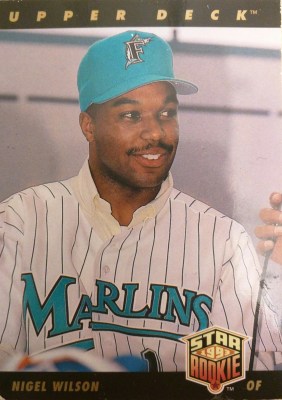Baseball has a tradition of family connections, brothers, cousins, fathers, and sons. Bobby and Barry Bonds. Ken Griffey Senior and Junior. Tito Francona and Terry Francona. Baseball family trees are part genetic and part network effect, but they add to the rich tapestry of the sport we follow. But sometimes, situations change. As they say, “nature finds a way.”
Nigel Wilson came to professional sports in a path slightly apart from these family pairings: cricket. His father, Edward, was a cricket player in Trinidad. Now, cricket isn’t baseball, and perhaps it’s true that nobody understands cricket, but then again, it might be similar enough that a genetic predisposition to baseball can be, if you excuse the pun, in the cards.
Wilson, born in Canada, was originally drafted by the Toronto Blue Jays. A Canadian drafted by one of the Canadian teams. Back in 1987 MLB had the Expos and Jays representing America’s northern neighbor. However this was not to be his permanent baseball home. He would, however, spend five seasons with their minor league affiliates, even reaching Double A in 1992. Although Wilson struggled in Low A in 1988 and 1989, he began to hold his own with a breakout season in the Sally League, batting .273/.326/.475 with 16 home runs and 22 stolen bases. When he reached Double A in ‘92 a .274/.325/.516 season gave the young player plenty of buzz.


Enough buzz in fact that Wilson would be a highly sought-after commodity in the expansion draft held that year to welcome the Colorado Rockies and then-Florida Marlins to the league. The Rockies had first pick and the Marlins, with the second pick, selected Wilson. (For those with keen eyes, that article was written by Gordon Edes, who was something of a journalism prospect back in 1992 before his larger national roles.)
”I’m just sitting in my hotel room with a smile on my face from ear to ear,” Wilson said Monday night from Lara, Venezuela, where he was playing winter ball for manager Garth Iorg, who also managed him last summer in Knoxville in the Southern League.
Marlins general manager Dave Dombrowski, known today as the GM for the Detroit Tigers, acting on a belief that Wilson was one of the “crown jewels” available to the expansion teams, snapped up the prospect. And Nigel Wilson’s life changed forever.
”I’d like to think I’m ready now, but we’ll have to wait and see,” Wilson said. ”Here, I’ve been facing Triple-A pitching, and a few guys who’ve pitched in the major leagues, and I’m batting over .300.”
Unfortunately, despite his excitement, Wilson was not long for the majors. In parts of three major league seasons he appeared in just 22 games and was hitless through sixteen at bats with the Marlins and seven with the Cincinnati Reds, who claimed Wilson on waiver from the Marlins. Claimed by the Cleveland Indians on Pi Day – March 14 – 1996 Wilson would finally collect his first major league hit. He’d get three in all, two of them being home runs, and pick up five RBI. For a guy ranked in the top 100 by Baseball America three times, who posted a 900+ OPS in Double A and Triple A in his final two minor league seasons, albeit at ages 25 and 26, his career never took off. His dream came true because he made it to the majors, but he never made his mark on the field. Heck, his photo on Baseball Reference is the one on this rookie card. Probably due to not much of a selection.
But that was his career before he went to Japan. In his first season with the Nippon Ham Fighters, Wilson “captured the batting crown in his first season with 94 RBIs, his second successive home run title the following season and went 4-4 with a three-run home run in 2000 before retiring the following season.”
After his playing days he returned to Ajax, Ont., where he went to high school, and founded The Competitive Edge, a baseball practice facility. For his work in the community, the Durham District School Board inducted him into their “Definitely Durham” Hall of Fame. Nigel Wilson didn’t have the on-field career he dreamed of, but his off-field work has still made him a hero among the kids in his community. And at the end of the day, he’s made a difference while being involved in the sport he loves. Isn’t that what we all want?
Next post: How Has BABIP Held Up as Leaguewide Offense Slides Ever Lower?
Previous post: A Look at Minimum and Average Salaries Over the Past 10 Years





Leave a Reply